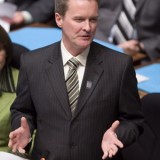Republished from BC Citizens for Public Power
The B.C. Energy Plan, portrayed by the Liberal government in 2002 as “clean energy leadership,” now appears as a thinly disguised campaign to privatize our public utility, B.C. Hydro. Backed by powerful international financing, our own government converted public assets into private hands for private profit, while raising our domestic electricity rates to pay for the swindle.
In 2001, Gordon Campbell and the B.C. Liberals made two election promises regarding our public energy utility. They promised to “Protect BC Hydro and all of its core assets, including dams, reservoirs and power lines under public ownership.” And they promised to “Restore an independent BC Utilities Commission” to regulate our electricity rates.
Once elected, they immediately broke both promises. The B.C. Energy Plan systematically dismantled, privatized, encumbered, and disempowered BC Hydro. The plan attacks our public power utility with a hundred small cuts. In the first stroke, they privatized BC Hydro operations, power transmission, and access to BC’s rivers. The plan forbids our public utility from increasing its power capacity and allows only private companies to generate new sources of electricity in the province. Finally, the plan creates a financial burden on BC Hydro, forcing it to buy unfairly priced power, which has caused BC Hydro – once a profitable public company – to lose millions of dollars, a recipe for the bankruptcy of public power.
Accounting tricks
In a recent study, economist Erik Andersen outlined how our own Government set out to bankrupt B.C. Hydro. The public utility has historically been profitable, returning income to help pay for B.C. schools, hospitals, and other services. For the year ending March 31, 2007, B.C. Hydro contributed $379 million dollars to the provincial treasury. Those days appear to be over.
In 2008 B.C. Hydro lost $72 million, and the year ending March 2010 indicates a net loss of $249 million. This is a reversal of $628 million in net income over four years. You might think the government would be horrified, but this has been their strategy all along. To hide this news from the public, the government drew money from the provincial “regulatory account,” and inflated intangible assets like “goodwill” on the balance sheet, accounting maneuvers used to hide the losses.
Meanwhile, the government has been increasing B.C. Hydro’s debt to pay for expensive power from private companies. This shows up in the debt-to-equity ratio, a measure of a company’s health. A company, like a family household, is more stable with low debt and high equity. Traditionally, BC Hydro’s debt/equity ratio has been about 70/30. By 2009 the debt had risen to an 81/19 ratio. If we exclude withdrawals from B.C.’s Regulatory Account, the 2010 ratio is 89/11. Any business person would tell you, this is a recipe for bankruptcy.
Public pays for Privatization
This destruction of B.C. Hydro is a tactic in the privatization of energy. Since the government has forbidden your energy utility from developing energy, we now buy about 16% of our energy from private corporations through 89 “Electricity Purchase Agreements,” contracts that force B.C. Hydro to buy power at 3-4-times the historic cost. We now pay $80 to $125 per megawatt-hour for energy that BC Hydro can generate for $20-$30 per megawatt-hour.
To subsidize this expensive power, the citizens of B.C. pay in two ways. First, energy rate hikes have added about 10% to our household energy bills, with another 6% increase planned. Secondly, the cost of energy is reflected in the financial losses of our public utility.
When the Liberal government began to privatize B.C. Hydro services, they hired Accenture, formed by refugees from the Arthur Anderson consulting firm associated with the Enron scandal. Accenture took over certain B.C. Hydro services, such as billing and administration. Energy Minister Richard Neufeld promised that B.C. Hydro would save $250 million in operating expenses over ten years. Under questioning from the opposition, Neufeld had to admit that he had not even read the Accenture contract. Now, six years into the privatization scheme, B.C. Hydro expenses have increased, not decreased.
The government has kept financial records with Accenture secret, so the public cannot see what is going on, but Will McMartin at the Tyee dug into the records to find out how we are doing.
Over the first six years of the contract with Accenture, the government budgeted to pay the private company $832.9 million dollars. In actual fact, the government has paid Accenture $1.168 billion, about $335 million over budget for six years. At this rate, through the ten year contract, the government will be over budget by about $560 million. So, instead of $250 million in savings for B.C. Hydro, these figures suggest there will be a $310 million increase in expenses. That means that Neufeld’s prediction was wrong by half a billion dollars! And who pays for this? You do.
Privatize the profits, socialize the costs
Meanwhile Accenture executives such as Peter Leighton and John Icke, who helped write the deal, have jumped onto the privatization gravy-train. Last March, the government awarded their company, Finavera Renewables, four Electricity Purchase Agreements.
Meanwhile, demand for electricity has not grown as the government claimed it would, and in fact has declined. In B.C., the demand for electricity has been falling since 2008, declining by 3.8% in the year ending March 2010. Demand for BC Energy by foreign customers has collapsed, which leaves B.C. Hydro and B.C. citizens stuck with expensive purchase agreements that are unnecessary.
Our government has privatized the profits and stuck the people with the losses. We need to restore BC Hydro, once one of our province’s strongest public companies and a competitive advantage for our economy. B.C. Hydro was a secure, public, long-term energy utility that could manage complex social, ecological, and energy values for our public benefit. Private power promotes consumption, while public power can conserve and operate at an optimum scale. Private power has a single goal: profit for a few insiders. Public power, operated by BC Hydro, can serve our complex public objectives, including conservation, job creation, and fair energy rates.








